98 results
4 - European Intellectual History after the Global Turn
-
-
- Book:
- Globalizing Europe
- Published online:
- 06 March 2025
- Print publication:
- 13 March 2025, pp 56-65
-
- Chapter
- Export citation
Spilling Millet: The East African Post and Studied Bureaucratic Knowledge
-
- Journal:
- The Journal of African History , First View
- Published online by Cambridge University Press:
- 20 February 2025, pp. 1-17
-
- Article
-
- You have access
- Open access
- HTML
- Export citation
Conclusion
-
- Book:
- New Sudans
- Published online:
- 06 February 2025
- Print publication:
- 13 February 2025, pp 305-309
-
- Chapter
- Export citation
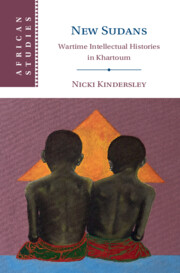
New Sudans
- Wartime Intellectual Histories in Khartoum
-
- Published online:
- 06 February 2025
- Print publication:
- 13 February 2025
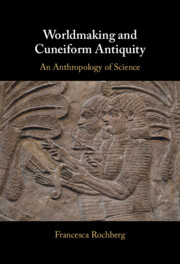
Worldmaking and Cuneiform Antiquity
- An Anthropology of Science
-
- Published online:
- 09 January 2025
- Print publication:
- 09 January 2025
Chapter 1 - The Reception of Hume’s Essays in Eighteenth-Century Britain
- from Part I - Reception
-
-
- Book:
- Hume's <i>Essays</i>
- Published online:
- 02 January 2025
- Print publication:
- 09 January 2025, pp 15-35
-
- Chapter
- Export citation
3 - Long Nineteenth Century
- from Part II - History
-
- Book:
- Contesting Pluralism(s)
- Published online:
- 19 December 2024
- Print publication:
- 02 January 2025, pp 61-94
-
- Chapter
- Export citation

The Art of Counterpoint from Du Fay to Josquin
-
- Published online:
- 05 December 2024
- Print publication:
- 12 December 2024
3 - Purchasing Freedom
-
- Book:
- Slavery and Freedom in Black Thought in the Early Spanish Atlantic
- Published online:
- 28 November 2024
- Print publication:
- 05 December 2024, pp 117-150
-
- Chapter
- Export citation
2 - Imagining Freedom
-
- Book:
- Slavery and Freedom in Black Thought in the Early Spanish Atlantic
- Published online:
- 28 November 2024
- Print publication:
- 05 December 2024, pp 65-116
-
- Chapter
- Export citation
4 - Defining Freedom
-
- Book:
- Slavery and Freedom in Black Thought in the Early Spanish Atlantic
- Published online:
- 28 November 2024
- Print publication:
- 05 December 2024, pp 151-188
-
- Chapter
- Export citation
1 - Proving Freedom
-
- Book:
- Slavery and Freedom in Black Thought in the Early Spanish Atlantic
- Published online:
- 28 November 2024
- Print publication:
- 05 December 2024, pp 22-64
-
- Chapter
- Export citation
5 - Reclaiming Freedom
-
- Book:
- Slavery and Freedom in Black Thought in the Early Spanish Atlantic
- Published online:
- 28 November 2024
- Print publication:
- 05 December 2024, pp 189-227
-
- Chapter
- Export citation
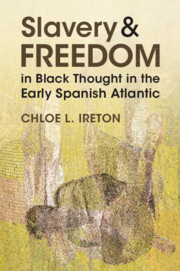
Slavery and Freedom in Black Thought in the Early Spanish Atlantic
-
- Published online:
- 28 November 2024
- Print publication:
- 05 December 2024
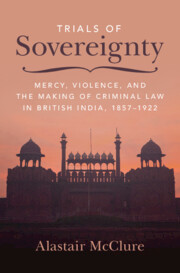
Trials of Sovereignty
- Mercy, Violence, and the Making of Criminal Law in British India, 1857–1922
-
- Published online:
- 20 November 2024
- Print publication:
- 28 November 2024
Chapter 21 - Dictionaries and Intellectual History
- from Part IV - Dictionaries and Domains of Use
-
-
- Book:
- The Cambridge Handbook of the Dictionary
- Published online:
- 19 October 2024
- Print publication:
- 31 October 2024, pp 421-437
-
- Chapter
- Export citation
From The Creators of Knowledge to the Specialists of Spirit: Anti-Clericalism in Iran’s Modernist Intellectual Discourse (1925–1941)
-
- Journal:
- Harvard Theological Review / Volume 117 / Issue 4 / October 2024
- Published online by Cambridge University Press:
- 31 December 2024, pp. 820-836
- Print publication:
- October 2024
-
- Article
-
- You have access
- Open access
- HTML
- Export citation
Cricket, Literary Culture and In-Groups in Early Twentieth-Century Britain
-
- Journal:
- Transactions of the Royal Historical Society / Volume 2 / December 2024
- Published online by Cambridge University Press:
- 09 September 2024, pp. 267-291
- Print publication:
- December 2024
-
- Article
-
- You have access
- Open access
- HTML
- Export citation
Chapter 1 - Introduction
-
- Book:
- Freedom and Power in Classical Athens
- Published online:
- 04 April 2024
- Print publication:
- 11 April 2024, pp 1-17
-
- Chapter
- Export citation
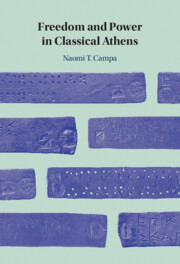
Freedom and Power in Classical Athens
-
- Published online:
- 04 April 2024
- Print publication:
- 11 April 2024

